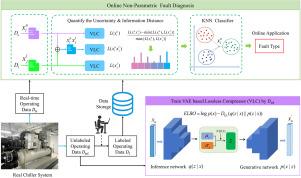Non-parametric semi-supervised chiller fault diagnosis via variational compressor under severe few labeled samples
IF 8
2区 计算机科学
Q1 AUTOMATION & CONTROL SYSTEMS
Engineering Applications of Artificial Intelligence
Pub Date : 2025-02-16
DOI:10.1016/j.engappai.2025.110233
引用次数: 0
Abstract
Intelligent fault diagnosis for chiller is essential for energy efficiency optimization and health management within Heating, Ventilation, and Air Conditioning systems. Deep learning-based chiller fault diagnosis methods have demonstrated competitive performance. However, certain challenges remain: (1) in large-scale chiller systems, obtaining labeled data is costly, leading to scarce labeled datasets; (2) large amounts of unlabeled data have not been fully explored. This paper proposes a semi-supervised fault diagnosis algorithm based on system complexity quantification. Firstly, a variational autoencoder-based lossless compressor is trained using unlabeled data in an unsupervised manner. Subsequently, Kolmogorov complexity is approximated via the compressor to achieve entropy-based quantification of complexity. Using the normalized information distance algorithm, an information distance matrix is then calculated, which is combined with a K-nearest neighbors classifier for fault diagnosis. The proposed method is validated using the ASHRAE 1043-RP and HY-31C datasets, and the experimental results indicate that the proposed method can use the severe few labeled samples to obtain a better diagnostic accuracy.

基于变分压缩机的非参数半监督制冷机故障诊断
制冷机的智能故障诊断对于供暖、通风和空调系统的能效优化和健康管理至关重要。基于深度学习的冷水机组故障诊断方法已经表现出了一定的竞争力。然而,某些挑战仍然存在:(1)在大型制冷系统中,获取标记数据的成本很高,导致标记数据集稀缺;(2)大量未标记数据未被充分挖掘。提出了一种基于系统复杂度量化的半监督故障诊断算法。首先,使用无标签数据以无监督的方式训练基于变分自编码器的无损压缩器。随后,通过压缩器近似Kolmogorov复杂度,实现基于熵的复杂度量化。利用归一化信息距离算法计算信息距离矩阵,并结合k近邻分类器进行故障诊断。利用ASHRAE 1043-RP和HY-31C数据集对所提方法进行了验证,实验结果表明,所提方法可以利用极少量的标记样本获得较好的诊断准确率。
本文章由计算机程序翻译,如有差异,请以英文原文为准。
求助全文
约1分钟内获得全文
求助全文
来源期刊

Engineering Applications of Artificial Intelligence
工程技术-工程:电子与电气
CiteScore
9.60
自引率
10.00%
发文量
505
审稿时长
68 days
期刊介绍:
Artificial Intelligence (AI) is pivotal in driving the fourth industrial revolution, witnessing remarkable advancements across various machine learning methodologies. AI techniques have become indispensable tools for practicing engineers, enabling them to tackle previously insurmountable challenges. Engineering Applications of Artificial Intelligence serves as a global platform for the swift dissemination of research elucidating the practical application of AI methods across all engineering disciplines. Submitted papers are expected to present novel aspects of AI utilized in real-world engineering applications, validated using publicly available datasets to ensure the replicability of research outcomes. Join us in exploring the transformative potential of AI in engineering.
 求助内容:
求助内容: 应助结果提醒方式:
应助结果提醒方式:


